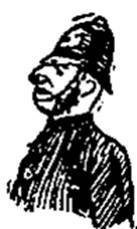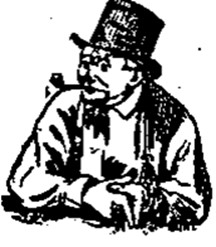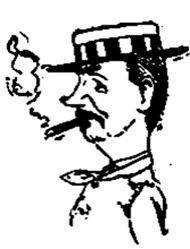This article has been transcribed from a copy of the Cardiff Times in the online collection of scanned Welsh newspapers 1804-1919 in the National Library of Wales, with grateful recognition of the free access accorded to all readers. Paragraph breaks have been introduced for easier reading. — David Skilton

HERE are some men who can afford to live without working, some men who are born with silver spoons in their mouths, which must be rather uncomfortable, bye-the-bye, from a physical point of view. Some men, too, marry money and live without working – and their wives generally let them know about it when the former are in bad tempers. It must be distinctly understood that in this article I do not refer in any degree to such persons as I have mentioned – to men, in fact, who can admittedly afford to live without working (I always speak of them with some degree of respect – for they are useful friends, eh?) I am writing, sir, of the men who are in some respects mysteries – of the men who live and don't work; of the men who, as I believe, would die if they did work. I am not for one moment, sir, going to attempt any moral dissertation upon drones in the hive of life (I call that sentence ‘werry good’; I shall charge extra for this article), for I am not good at ‘prayching’; I only intend referring to a few people I have observed, and who always seem to have money to spend and never appear to earn any.

‘I’ve got my Hye on yer’
Of course, if I myself wished to live without working I should join the police force, which ‘plays harder’ than any body of men I know of. When I had been a month in the force I should get a watch – if I didn’t the watch-committee, would probably dispense with my services. You never met with a policeman who hadn't a watch – even if it was only a night-watch, a day-watch, or a Waterbury [Timex]. This would supply me with lots of little emoluments. For instance, I should go into an hotel and call for a glass of rum hot; then I should fumble about in my pockets (policemen's pocket are so hard to get at – rather) till the landlord said ‘All right, lad,’ with a wink. Then again I should look after lost dogs and children, and leave all the thieves alone. The thieves can take care of themselves; they don't want any of your interference; they can take care of themselves – the lost children can't, and the mothers of the latter are always good for sixpence and a nip of something comforting.

‘Prepare to receive – refreshments’
Next to policemen, the men who do nothing most agreeably are militiamen. It is true that they are called up occasionally by the military authorities – and by the magistrates, but this only serves to pass the time away. They have no fighting to do – except among themselves. I judge that they would fight well on occasion – if they had to storm a canteen, for instance. In such a case as that they would be found where the enemy was most numerous.
But, sir, beyond these heroes there are men who wax fat without working. They get up about dinner time – possibly to save a meal, and then they commence a day of intellectual enjoyment; they go to the police court or to a football match or a quoit match, or they sit in a public-house (especially on a Monday) till a man with some money, and the disposition to spend it, turns up. Then they are in their natural element – beer! As a general rule it is supposed that their relations are ‘well-to-do,’ and they themselves must find that it is well to do their relations. Some of them affect to do ‘odd jobs' – very ‘odd’ jobs – indeed, I should imagine.

A loafer hard at work.
They are always (according to their own account) on the look out for work. They look out for work by leaning over the front railings, smoking. By their own statements (if you are on such terms of intimacy to cross- examine them) they generally belong to some trade wherein work is often scarce. Where there is work, you will often find that they are scarce. With them trade is always bad – any sort of work is ‘bad’” with them, in fact – or ‘sIack.’ How they live goodness (or badness) above knows. Their wives and daughters must work, I suppose, or they have a lodger or two. Of course, if their wives and daughters are employed it wouldn’t beseem them to work – they must stop at home and see that no one runs away with the house; it isn't well to leave a house, like a borrowed five-pound note, all a loan. In a somewhat better class you find innumerable beings who are supposed amongst their acquaintances to be ‘agents,’ but where the agency comes in no one can precisely say. Some of them are presumably in the spirit trade, judging by the amount of the spirit trade which goes into them. They commence business rather late, but they make up for it by leaving off early. Their office hours are by no means so long apparently, as their off-ish hours. They will boastfully assure you that they are demons to work when they begin, but as no one ever sees them begin they never call witnesses to prove their statements. Some of them affect to do something ‘on the turf;’ though, to all appearance, their transactions never exceed a shilling, and then you oftener see them receiving ‘trifles’ than paying them. And then, sir, by referring to my list of persons who live without working, I find war office clerks, and music-hall ‘stars,’ and lecturers for the ‘Society for the Spreading of Shirts before the Heathen.’

Employed by ‘Street and Walker’
Then there are diplomatists, and billiard markers, and corporation officials, and German Princes, who have the best of the bargain in this life. Men like you and myself, sir, who industriously plod and eat the bread of honest industry, are not half so well off as inspectors (of all sorts and sizes) and other men who live without working. Somehow I always myself stuck to work; I found that work stuck to me, perhaps that's the reason. And I can always work best when I have nothing to do; I can go in with such a swing and do it. But it does not appear to me that, in the case of many men, work is a necessity. All men are differently constituted, you know, and I call it a hardship that a man who is built the other way should have to toil like the born workers. Sometimes I think that I myself was not born to work, but I am soon disillusioned in that regard – especially about Saturday, when I find that the balance due to me is not what it ought to be. I wish I had an uncle (I don't mean what you mean) or somebody or other who would say that he didn't think I ought to ‘strike a bat’ [pay for drinks?]; I would bless him, and say that I agreed with him.
Last modified 28 January 2022